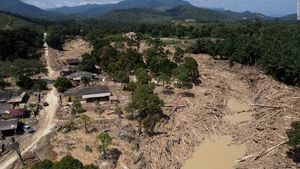Farmers Embrace Maggot Farming to Combat Drought Woes
At first glance, it seems like the kind of idea meant to make stomachs churn. But for farmers like Mari Choumumba from Nyangambe, Zimbabwe, what initially sounded like a grotesque suggestion turned out to be their ticket to financial survival amid devastating droughts. With traditional agriculture struggling against climate adversity, the practice of maggot farming is catching on, transforming waste products and fears associated with flies and disease to innovative agricultural practices.
The story of Choumumba is one of resilience and adaptation. The Southeastern Zimbabwean region where she resides has been particularly hard-hit by droughts, which decimated the area’s staple crops, especially maize. A year ago, when agricultural experts including representatives from the United States Agency for International Development (USAID) pitched the idea of farming black soldier flies for their maggots, it was met with confusion and skepticism. Many locals equated flies with disease—specifically cholera outbreaks, frequently exacerbated by poor sanitation and extreme weather.
Choumumba recalls, “We were alarmed when they introduced the maggot farming concept. People were seeking food aid, and instead, we were told about maggots.” Her initial reaction reflected widespread sentiment; flies, after all, were usually viewed as pests to be eradicated rather than cultivated. Despite the discomforting nature of the proposal, the necessity of the situation prevailed. Within just 12 months, Choumumba has turned what many initially viewed as nonsense to the gratifying reality of breeding maggots, creating livestock feed and substantially cutting costs.
Today, she carries out her work with pride, feeding organic waste—like rotting fruit and vegetable scraps—to her maggot colony, housed securely behind wire mesh at her homestead. After regular harvesting, she converts the maggots, rich in protein, to feed her chickens. The newfound practice not only serves as animal fodder but has also enabled her to produce eggs for sale, impacting her financial situation positively.
This approach has been beneficial for the environment too. According to Zimbabwe’s Environmental Management Agency, the country produces close to 1.6 million tons of waste annually, with about 90 percent deemed recyclable. By utilizing organic waste to breed black soldier fly larvae, farmers like Choumumba are not just addressing their own protein shortages but are also recycling materials otherwise destined for landfills.
Before maggot farming became viable, as much as 80 percent of production costs for small farm operations were attributed to conventional feed. For many farmers, purchasing these feeds came at exorbitant prices—around $35 for just 50 kg of poultry feed. The introduction of maggot farming has significantly slashed these costs, reportedly dropping them by about 40 percent. Suddenly, feeding livestock is more sustainable and cost-effective.
Researchers sing the praises of black soldier flies, noting their extraordinary life cycles—laying between 500 and 900 eggs and maturing rapidly. Unlike other flies, they do not spread diseases. Robert Musundire, an agricultural science professor at Zimbabwe's Chinhoyi University of Technology, explains, "These maggots present 55 to 60 percent crude protein, which is superior to conventional feed such as soya at much greater cost.”
The objective of implementing such farming practices extends beyond individual farmers’ benefits; it paints broader hopes for the agricultural sector amid climate change challenges. Government initiatives, along with partnerships from various organizations, including the World Bank, are actively pushing for the expansion of maggot farming initiatives to provide alternative routes for food security response strategies.
Changing the perception of “maggot farming” is another challenge, particularly when fears stemming from public health threats still linger. With initial resistance, farmers have gradually shifted their mindsets. Choumumba reports, “What was just five percent of farmers agreeing to try this idea has now jumped to fifty percent as they recognize the protein benefits and understand the role of the black soldier fly.” It's clear the ``yuck factor’’ has slowly but surely been eclipsed by the necessity and vision to thrive.
Not only is this endeavor helping farmers put food on the table, but they're also giving their communities means to utilize local resources efficiently. Choumumba, for one, has started mingling with her neighbors, collecting kitchen scraps and unused food items to feed her maggots. Community-wide engagements are assuring local cooperation and supporting livelihoods.
Many women like Choumumba are now part of the maggot farming initiative, with over fourteen women from her village getting involved. While the initiation period may have been riddled with skepticism, the thriving example set forth by early adopters is catalyzing similar projects across the region. It portrays the depth of human ingenuity and the lengths to which communities will go to adapt to and overcome challenges posed by nature.
Addressing the issue of climate change calls for outside-the-box thinking and creative solutions, as demonstrated through this initiative. Transitioning to maggot farming stands as ample proof of how rural farmers faced with financial and environmental challenges are reclaiming stability. The practice encourages recycling of food waste—aligning not only the agricultural industry with eco-friendly trends but also promoting sustainable living practices.
While nobody may want to visualize wriggling maggots, the reality reveals something much more substantial; hope and innovation. With farmers like Choumumba at the forefront, maggot farming could very well revolutionize agricultural practices, proving to be both profitable and environmentally sustainable, and providing needed resilience against future attacks from climate-related vulnerabilities.
The benefits are now too compelling to ignore. From avoiding waste dumps to solving feeding problems, the potential solutions entwine directly with urgent needs, all encapsulated under the proverbial banner of ingenuity and survival. Anyone doubting the power of innovation and adaptability should take note of these bold farmers taking strides against climate challenges—one maggot at a time.



